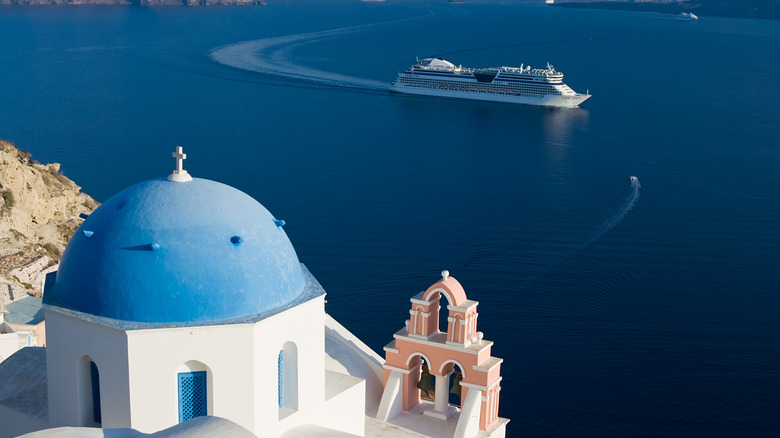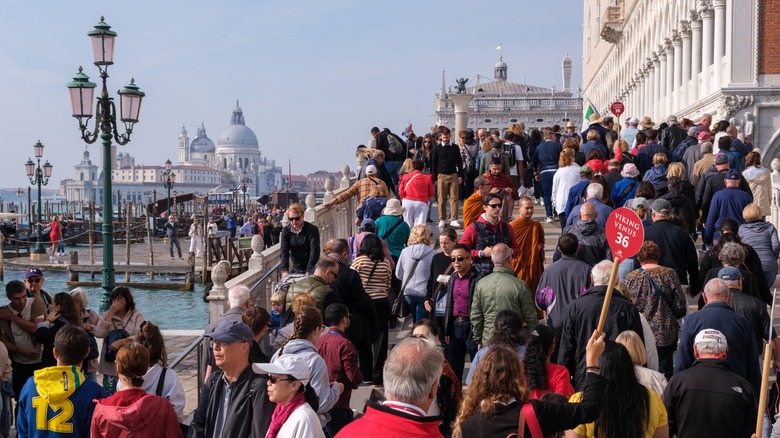Planning A Greek Island Cruise? A New Tourist Fee Could Impact Your Trip (Here's What You Need To Know)
Prepare to pony up extra on your next Greek island cruise. The Greek government has implemented a new sustainable tourism fee for passengers disembarking from cruise ships. The fee, which takes effect the summer of 2025, applies to all Greek islands but is higher for certain destinations. Most islands will charge a €5 fee (about $6), while the hotspots of Santorini and Mykonos will hit cruise passengers with €20 (roughly $23). After September 30, fees will drop to €3 (about $4) for most islands and to €12 (around $14) for Santorini and Mykonos. From November through March, the low season, feels plummet to €4 for Santorini and Mykonos and just €1 for the rest of the Greek isles.
Expect to pay your cruise company directly, after which they'll remit the tax to each destination on a quarterly basis. Island hoppers beware, as fees will be charged at each port. If you've been itching to tick Santorini or Mykonos off your bucket list but aren't crazy about the potential new dent in your wallet, consider visiting Greece's wildly affordable alternative to Santorini with beautiful beaches and thinner crowds, or skipping crowded Mykonos for a more affordable Greek island with golden beaches.
The tax is intended to combat overtourism to Greece's historic, increasingly overwhelmed islands. About 40 million tourists visited Greece in 2024, according to the Bank of Greece (via Ekathimerini), including 7.9 million who arrived by cruise ship, per data from the Hellenic Ports Association. That marked a 13% increase from the year prior, when 768 cruise ships docked in Mykonos alone. Surprisingly, the lesser-hyped Zakynthos is Greece's most heavil touristed island, according to a study by Which? Travel (via Euronews), with a ratio of about 150 for every resident. Ironically, the island is often marketed as a "hidden gem."
The crack down on cruise overtourism
Taxing tourists is one way to manage overtourism, which can damage the environment, strain infrastructure, and diminish the quality of life for residents — as well as ruin the experience for travelers. Greece is the latest in a growing list of European nations requiring tourists to plunk down money for the privilege of entry. In a desperate bid to protect its heritage from the roughly 30 million visitors (via CNN) who traipse along its fragile canals each year, Venice banned cruise ships from its historic center in 2021. In 2024, the city introduced a precedent-setting "access fee," which doubled from €5 ($6) to €10 ($12) for some specific days in 2025. The city's residents also pooled resources to buy and transform Poveglia, an abandoned island in the Venetian Lagoon, into a residents-only urban park.
Other popular European destinations are also targeting "daytrippers", cruise passengers who wash ashore for a day but contribute little to the local economy. Both Nice and Cannes on the French Riviera are pushing to severely restrict the number of cruise ships and passengers visiting their ports. "The cruises that pollute and dump their low cost-clientele who consume nothing, but leave their waste behind... these cruises have no place with us," Nice Mayor Christian Estrosi told residents (via Euronews). Barcelona, the busiest cruise port in all of Europe, is taking even more drastic measures with plans to demolish two of its cruise ship terminals.
Mexico, another wildly popular cruise destination, is also cracking down on cruisers. As of this writing, they pay a $5-per-person tax, which is slated to increase every year by $5: $10 in August 2026, $15 in July 2027, $20 in August 2028.

